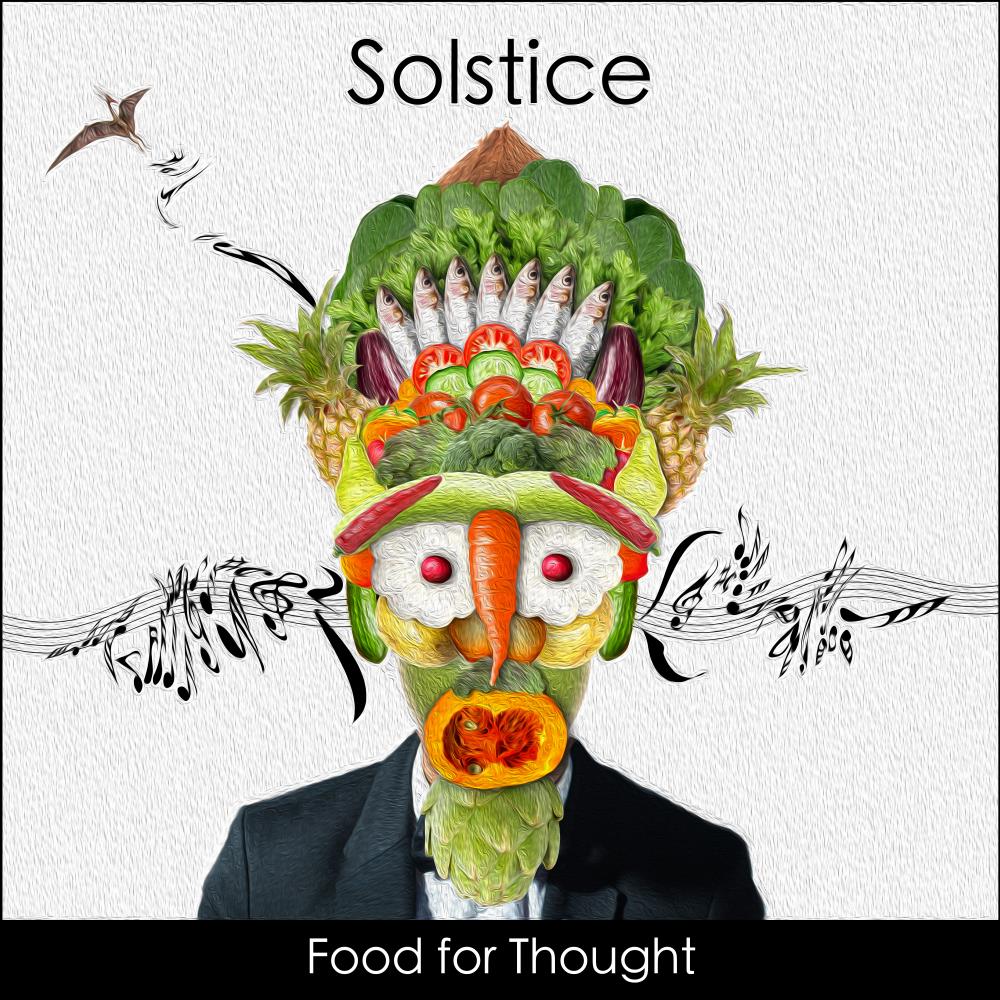SOLSTICE - Food for Thought
Ubuntu Music UBU0061
Tori Freestone (tenor sax, soprano sax, flute); Brigitte Beraha (voice); John Turville (piano, keyboards); Jez Franks (guitar); Dave Manington (double bass); George Hart (drums)
Recorded Master Chord Studio, London. No recording date
Not to be confused with the English prog-rock band or the American death metal group of the same name, this Solstice describes itself as a collaboration between musicians who share a love of contemporary jazz, food and wine – what’s not to like? Indeed, their band website includes a series of photographs, with each band member posing with a drink or an item of food. The album cover has clearly been inspired by the Italian artist Giuseppe Arcimboldo, famed for his portraits composed of images of fruit, vegetables and fish. This album was released as a digital version in early 2021, with limited edition physical releases (LP and CD) out in late 2021.
The musicians are bandleaders in their own right and have worked together in various formats. The quality of musicianship can be discerned by the people Solstice’s band members have played or recorded with: Andy Sheppard, Jamie Callum, Chris Laurence, Asif Sirkis, Tim Garland, Michael Garrick, Peter King, Gwilym Simcock, John Etheredge, Bobby Wellins, Sam Saltzman, Soweto Kinch and Cleo Laine, to name but a few.
This is the follow-up to the band’s 2016 album, Alimentation, which had a number of tunes with food-themed titles, including ‘Ultimate Big Cheese,’ and ‘Avocado Deficit.’ None of the titles on this album refer to food and I confess to being slightly disappointed that there wasn’t a song called ‘If Music Be The Food of Love”…(I’ll get my coat).
The eight tunes have been composed by the band members (only drummer George Hart doesn’t contribute a song to the album) and the music is a mix of jazz, rock, folk, Latin and funk, with a dollop of avant-garde. The lead instrument on the album is undoubtedly Brigitte Beraha’s voice. With a sound that has been inspired by the likes of Norma Winstone, Tania Maria and Flora Purim, on some songs, Beraha’s vocals are haunting and ethereal. On others, her voice harmonizes with an instrument or doubles-up with it to fatten the sound. Most tunes have wordless vocals.
‘Hermetica’ is inspired by the Brazilian musician/composer Hermeto Pascoal (Miles Davis fans will recognise the name from the Live-Evil album). With a tight Latin groove played on acoustic guitar, drums and electric piano, Beraha’s vocals are to the fore and she performs some impressive verbal gymnastics in places. Tori Freestone also plays a flowing flute solo. ‘PTSD’ is an atmospheric ballad, with Beraha’s haunting voice and the music drifting like a slow-moving mist over a moor. Freestone’s tenor sax bursts out for an intense solo, with Hart providing great support, firing up a cascade of fast, furious fills.
Many of the tunes take off in unexpected directions. ‘Dreams’ for example, starts off with ghost-like vocals accompanying a repeatedly plucked bass string, and then two-and-a- half minutes in, a guitar riff takes the tempo up a few notches, before Jez Franks unleashes a fiery rock guitar solo. This is followed by a section featuring drum and vocal pyrotechnics, before a shimmering piano riff returns the tune to its original slow tempo.
‘The Three Omegas’ (great title!) is more or less a wordless vocals/piano duet, with good bass and piano solos. ‘Close To Home’ has a dramatic opening. Beraha’s wordless vocals are drenched in reverb – she sounds as if she is standing on a mountain top and singing out to the surrounding landscape. There’s a mysterious, slightly disturbing quality to song’s aural landscape: sounds dart in and out; rise and fall; crash and decay. An electric piano enters and a Latin riff starts-up. Strange vocalisations appear and ghostly voices jump out, with lines such as, ‘Whenever the moon takes me,’ - it’s a bit like Alice in Wonderland meets jazz. Freestone delivers a snaking tenor sax solo, with some phrases seemingly inspired by the playing of Ornette Coleman, followed by a free-flowing piano solo by Turville. If that all sounds a bit odd, don’t be fooled – it all works really well.
‘Quetzalcoatlus’ (the name of a dinosaur, believed to be the largest flying animal of all time, since you ask) is a quirky nu
mber with Hart playing an array of time signatures and Franks unleashing a scorching guitar solo. ‘Familiar Fractals’ is a vocal tour-de-force that enables Baraha to display her superb range, power and expression over a ten-minute, dream-like piece, accompanied by Freestone’s wailing tenor sax. The closer, ‘Haven’t Met You Yet’ is a ballad featuring Baraha’s light, delicate vocals and a sparse array of instrumentation. It’s a fine ending to an album that offers a refreshing – and richly rewarding – approach to jazz. And I’ll drink to that.
Reviewed by George Cole
